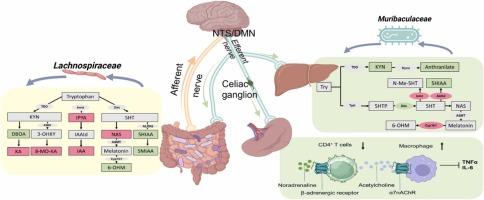当前位置:
X-MOL 学术
›
J. Hazard. Mater.
›
论文详情
Our official English website, www.x-mol.net, welcomes your
feedback! (Note: you will need to create a separate account there.)
Systemic inflammatory response to daily exposure to microcystin-LR and the underlying gut microbial mechanisms
Journal of Hazardous Materials ( IF 12.2 ) Pub Date : 2024-09-16 , DOI: 10.1016/j.jhazmat.2024.135855 Yanyan Zhao, Harry Sokol, Qing Cao, Hui Zhang, Yunjun Yan, Liqiang Xie, Haotian Wang
Journal of Hazardous Materials ( IF 12.2 ) Pub Date : 2024-09-16 , DOI: 10.1016/j.jhazmat.2024.135855 Yanyan Zhao, Harry Sokol, Qing Cao, Hui Zhang, Yunjun Yan, Liqiang Xie, Haotian Wang

|
Cyanobacterial toxins have raised global concerns due to potential chronic disease implications from daily drinking water exposure, which remain largely unknown despite extensive research on their acute effects. To understand the mechanisms underlying microcystin-LR (MC-LR)-induced inflammation-associated diseases. Mice were exposed to MC-LR for one year at concentrations comparable to human environmental exposure levels. Comprehensive pathological observation and multi-omics approaches based on 16S rRNA gene sequencing, untargeted metabolomics, transcriptomics and proteomics were conducted across various organs. Daily exposure to MC-LR induced intestinal microbial dysbiosis and colitis-like changes. It also caused systemic chronic inflammation marked by elevated serum levels of inflammatory cytokines, inflammation-associated pathological changes, and identification of infection-related genes/proteins within the gut-brain-spleen-liver axis. Furthermore, multi-omics analysis across organs suggested that Muribaculaceae may promote a systemic infection-inflammatory response, relying on kynurenine metabolites signaling in peripheral tissues. In contrast, Lachnospiraceae may act an opposing role, dependent on intestinal indole derivatives via the neuroimmunomodulation pathway. A fecal microbiota transplantation experiment confirmed that alterations in Muribaculaceae and Lachnospiraceae resulting from exposure to MC-LR triggered the local and systemic chronic inflammation in mice. This study light on the potential strategies employed by gut microbial community in regulating MC-induced inflammation-associated chronic diseases under repeated exposure through drinking water.
中文翻译:

对每日暴露于微囊藻毒素-LR 的全身炎症反应和潜在的肠道微生物机制
由于日常饮用水暴露可能对慢性疾病产生影响,蓝藻毒素引起了全球的关注,尽管对其急性影响进行了广泛研究,但这些影响在很大程度上仍然未知。了解微囊藻毒素 LR (MC-LR) 诱导炎症相关疾病的机制。小鼠暴露于浓度与人类环境暴露水平相当的 MC-LR 一年。对各个器官进行基于 16S rRNA 基因测序、非靶向代谢组学、转录组学和蛋白质组学的综合病理观察和多组学方法。每天暴露于 MC-LR 诱导的肠道微生物群失调和结肠炎样变化。它还引起全身性慢性炎症,其特征是血清炎性细胞因子水平升高、炎症相关病理变化以及肠-脑-脾-肝轴内感染相关基因/蛋白质的鉴定。此外,跨器官的多组学分析表明,Muribaculaceae 可能促进全身感染-炎症反应,依赖于外周组织中的犬尿氨酸代谢物信号传导。相比之下,毛螺菌科可能起相反的作用,通过神经免疫调节途径依赖于肠道吲哚衍生物。粪便微生物群移植实验证实,暴露于 MC-LR 导致 Muribaculaceae 和 Lachnospiraceae 的改变触发了小鼠的局部和全身慢性炎症。本研究揭示了肠道微生物群落在通过饮用水反复暴露下调节 MC 诱导的炎症相关慢性疾病所采用的潜在策略。
更新日期:2024-09-16
中文翻译:

对每日暴露于微囊藻毒素-LR 的全身炎症反应和潜在的肠道微生物机制
由于日常饮用水暴露可能对慢性疾病产生影响,蓝藻毒素引起了全球的关注,尽管对其急性影响进行了广泛研究,但这些影响在很大程度上仍然未知。了解微囊藻毒素 LR (MC-LR) 诱导炎症相关疾病的机制。小鼠暴露于浓度与人类环境暴露水平相当的 MC-LR 一年。对各个器官进行基于 16S rRNA 基因测序、非靶向代谢组学、转录组学和蛋白质组学的综合病理观察和多组学方法。每天暴露于 MC-LR 诱导的肠道微生物群失调和结肠炎样变化。它还引起全身性慢性炎症,其特征是血清炎性细胞因子水平升高、炎症相关病理变化以及肠-脑-脾-肝轴内感染相关基因/蛋白质的鉴定。此外,跨器官的多组学分析表明,Muribaculaceae 可能促进全身感染-炎症反应,依赖于外周组织中的犬尿氨酸代谢物信号传导。相比之下,毛螺菌科可能起相反的作用,通过神经免疫调节途径依赖于肠道吲哚衍生物。粪便微生物群移植实验证实,暴露于 MC-LR 导致 Muribaculaceae 和 Lachnospiraceae 的改变触发了小鼠的局部和全身慢性炎症。本研究揭示了肠道微生物群落在通过饮用水反复暴露下调节 MC 诱导的炎症相关慢性疾病所采用的潜在策略。































 京公网安备 11010802027423号
京公网安备 11010802027423号